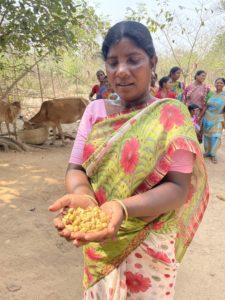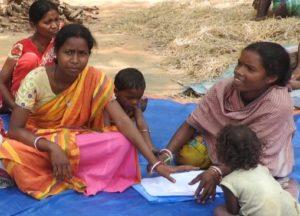Pameli Baiga, a 42 years old PVTG woman, mother of a child, belongs from Ghogra village of Chhattisgarh state, where poor literacy rates, slow pace of development, high levels of malnutrition driven by communicable disease, high dependency on land and forest produce are some of the major issues. She took digital training from IBRAD and for the first time started her own organic nutrition garden to cultivate different types of vegetable.
As a forest dweller, Pameli’s family depends on forest products. After the implementation of FRA 2006, she got the right to hold 3 acres land for making a livelihood. Pameli earns about Rs. 9000 by selling products from the Mahua and Kendu trees that exist on her land. Along with Pameli most of the Baiga families are small land holders but can’t depend solely on agriculture due to lack of access to new agri-technologies, excessive production costs, lack of irrigation facility and all these has put the forest fringe tribal farmers at an edge.
Pameli sowing chana on her land.
Malnutrition is a curse for these poverty sticken Baiga community. Hence IBRAD intervened in this community to meet their immediate nutritional need. After taking digital training from IBRAD on organic farming, land preparation and use of organic pesticide, Pameli started to cultivate vegetables at the backyard of her house. She followed all the steps of establishing a nutrition garden as seedbed preparation with the organic ball, mulching the bed, organic seed treatment practice before seed sowing, fencing the garden, etc. IBRAD gave capacity building training and hand-holding support by giving seeds, Azophos (fungicide) to her. Now she produces vegetables in the nutrition garden year round.
She now finds interest to cultivate different vegetables organically on her vacant land and this helps her to meet the daily consumption requirement of her 4 membered family while maintaining the nutritional value. Previously, she used to spend money for buying vegetables from market for daily consumption while compromising on nutritional value of vegetables. Now she saves that money and spends that for the education, clothes of her child.
Pameli is an example how a tribal mother who lives in a forest fringe remote village can support her family meeting their food and nutritional requirements and lead her child towards a better future.
* Here pseudo name is used so that the identity is not disclosed.






